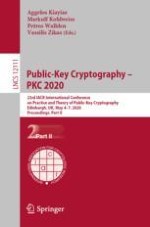2020 | OriginalPaper | Buchkapitel
Generic Authenticated Key Exchange in the Quantum Random Oracle Model
verfasst von : Kathrin Hövelmanns, Eike Kiltz, Sven Schäge, Dominique Unruh
Erschienen in: Public-Key Cryptography – PKC 2020
Aktivieren Sie unsere intelligente Suche, um passende Fachinhalte oder Patente zu finden.
Wählen Sie Textabschnitte aus um mit Künstlicher Intelligenz passenden Patente zu finden. powered by
Markieren Sie Textabschnitte, um KI-gestützt weitere passende Inhalte zu finden. powered by
